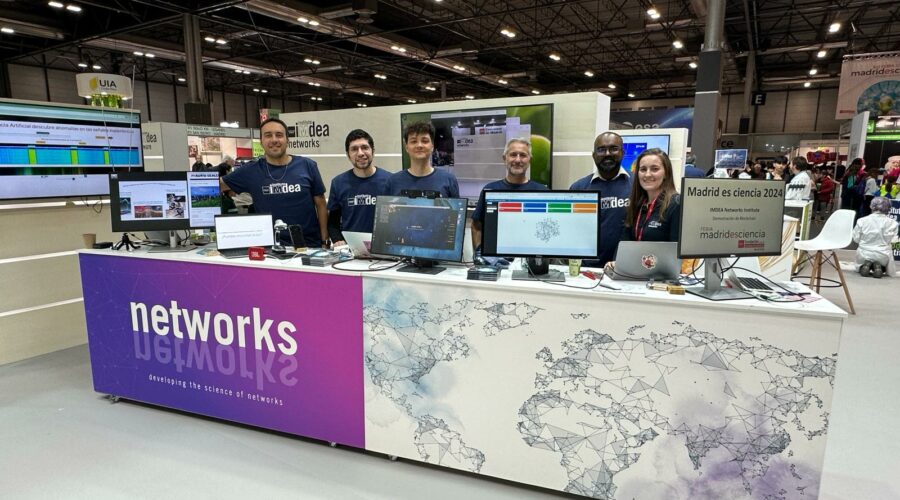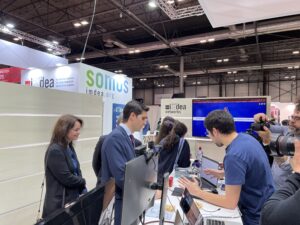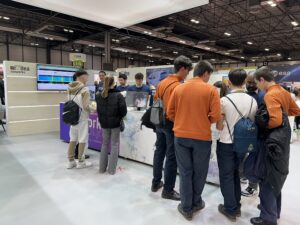IMDEA Networks

IMDEA Networks at the XIII edition of Madrid is Science Fair
The public discovered through educational and fun games how computers "see" the world, how we can transmit music through light and how to detect anomalies in the electromagnetic spectrum thanks to artificial intelligence, among other things
11 March 2024

Hundreds of people visited the IMDEA Networks stand at the ‘Madrid is Science Fair’ which took place from Thursday, March 7th to Saturday, March 9th at IFEMA’s Pavilion 5. The thirteenth edition of the largest science outreach event held in Madrid and organized by madrimasd has been a complete success. During three intense days, the IMDEA Networks research team taught students of all ages and the general public how we make technology through fun and educational games. We have also received the visit of the Minister of Education, Science and Universities Emilio Viciana and the Vice-Minister of Universities, Research and Science Ana Ramírez.

Our PhD student Orlando Martínez has prepared several demos to show how computers see the world. Those who have participated in his game have been able to observe how computer vision is used in everyday life, from traffic fines, and autonomous cars to Instagram filters. Adults and children enjoyed controlling rockets with their heads.
They also discovered that light can be heard with the experiment conducted by our PostDoc researcher Diego Madariaga. He exemplified how information can be transmitted wirelessly. With just an LED lamp and a mini solar panel, we can see how sound travels to our speaker thanks to light.
Alessio Scalingi, a PhD student, has explained how to detect anomalies in the electromagnetic spectrum. Artificial intelligence (AI) plays an important role in signal security by recognizing which signals should not be there because they are trying to interfere or eavesdrop, and can help block them or inform the right people to take action. In addition, AI can be useful in designing more secure and efficient communication systems, learning from past attempted attacks, and adapting to defend against new threats.
The audience was also able to learn how to use the indirect polling method, which they have used to estimate voting intentions in elections or to monitor the evolution of COVID. What they do is ask a person about the number of contacts they know who have voted for a particular party or who have been infected to make an estimate. Researchers Antonio Fernández and Sergio Díaz have stressed that this is a very effective method, since it ensures the privacy of those who participate, few samples are needed, and it can be used to find out what the popular feeling is regarding a social issue.
 On the other hand, those who have visited our stand have had fun with the game created by Nicolás Borrajo on quantum computing, in which they had to connect different points following the shortest path and trying to compete with a quantum computer. At the same time, they have been able to learn how blockchain works in an informative way from the hand of our predoctoral researcher Arivarasan Karmegam and they have known what the democratic quality of different countries is through the power of machine learning thanks to the demo made by our senior researcher José Aguilar and our research engineer Diego Benito.
On the other hand, those who have visited our stand have had fun with the game created by Nicolás Borrajo on quantum computing, in which they had to connect different points following the shortest path and trying to compete with a quantum computer. At the same time, they have been able to learn how blockchain works in an informative way from the hand of our predoctoral researcher Arivarasan Karmegam and they have known what the democratic quality of different countries is through the power of machine learning thanks to the demo made by our senior researcher José Aguilar and our research engineer Diego Benito.
Finally, the audience was able to play Kahoot which Rita Ingabire played to deepen their knowledge about networks. In short, three days where we have been able to enjoy the best science at the service of society and with the clear objective of improving their lives.


Recent Comments